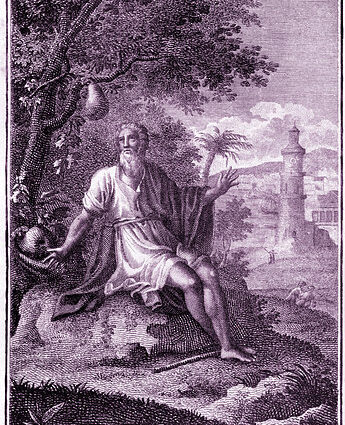A few years ago, on a silent retreat, I was struck by just how beautiful the day was. The wind was blowing just enough to keep the heat away. Butterflies and dragonflies were darting too and fro, occasionally landing on my hand or leg. The sun was reflecting on the waves of the great Mississippi River. I’d hear the sound of a tug or barge echoing in the distance, close enough to remind me the world was still moving but far enough away that I felt apart from it. Squirrels darted around the trees, and rabbits chewed lazily on the clover as summer passed slowly in the presence of the small chapel where we had just received Jesus in the Eucharist. Ahh, I thought to myself, what would make this moment perfect is for a deer to walk out of the woods right now.
Isn’t that just like us? God gives us so much beauty in our lives, but we always think our plan is better. We seem to think we know best, and when things don’t go the way we want, well, we get upset. That’s where we find Jonah in the first reading. Jonah didn’t want to deal with the Ninevites. They were his ‘other.’ His ‘them.’ The brutalities they had inflicted on others seemed just too much for him. So, he went the other way. God instead brought him back to the shores of Ninevah, and Jonah marched into town, preaching the message he had been sent to preach. Then Jonah was upset because the Ninevites actually converted! So, moping, he went off to a high vantage point to set up ringside seats to try and watch, hoping they would be destroyed.
God grew a plant, seemingly instantly, to help provide shade for Jonah. The following day it withered and died. Jonah got upset because of the plant, so upset he wanted to die! Why bother going on? Nothing is going as I want it to. Instead of being happy that the plant was there to provide shade for one day, an unmerited grace, he’s upset it’s not there anymore. Jonah missed the miracle of the plant sprouting up in one single day because he was too absorbed in his own unhappiness. The thing is, it was never about the plant. God reminded Jonah that he missed the great miracle of an entire nation turning to God in one afternoon because Jonah was too consumed with his own ideas and prejudices.
That’s where radical gratitude comes in. It’s being thankful for things now and not so attached to them when they are gone that we find ourselves bitterly waiting for death. Being present to our family and friends, and then when God forbid they are gone, we remember the beauty of their presence more than the agony of their loss. That’s not easy to do. It’s easy to be thankful when your house is full of food, not so much when it, and your bank account is empty. Our stomach is empty. Our heart is empty.
Interestingly enough, at Mass, we pray the prayer that Luke speaks of in the Gospel, asking for God’s kingdom to come. That’s a big thing! So I guess for me, the question today is: am I praying for God’s kingdom to come in my own estimation of what it should look like? Am I like Jonah rushing the kingdom to be here because it represents an end to things I dislike? Or am I praying for God’s kingdom to come in the form of his great mercy and grace? Because that’s where the true beauty lies. That’s what we are praying for in the Our Father. A world made new, a heart made new, an “I myself made new.”

